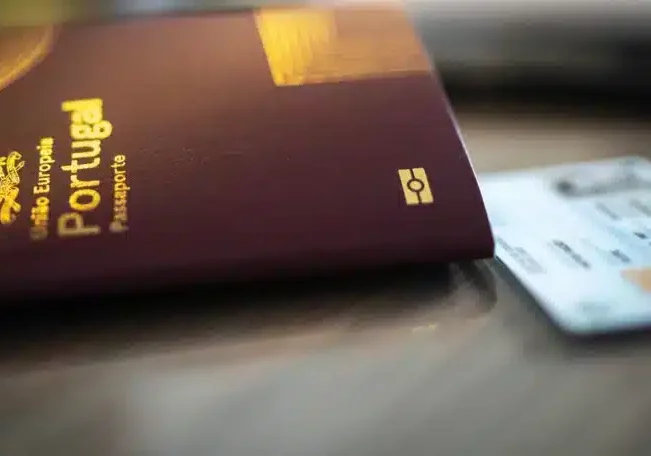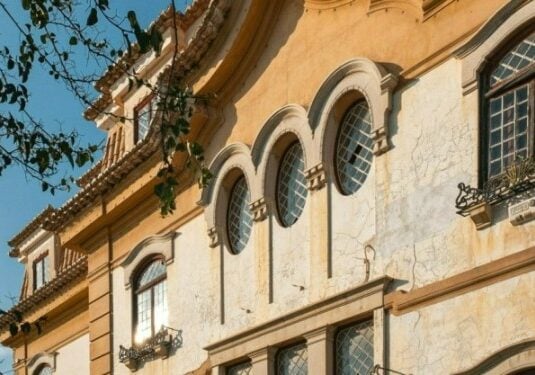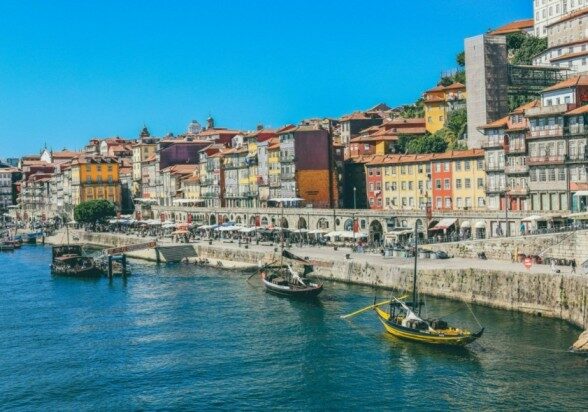Updated: December 10, 2025
The D7 Visa Portugal allows non-EU citizens to obtain residency in Portugal based on their stable passive income.
It’s designed for individuals like retirees with pensions, those who earn rental income, or those with sufficient dividend income. The key eligibility requirement is to demonstrate sufficient and stable passive income of at least €870.
In this guide, we’ll explore all the Portugal D7 Visa requirements that must be met, who is eligible to apply, and the exact application process for non-EU citizens. We’ll also look at the benefits that D7 Visa holders have access to.
What is a D7 Visa in Portugal?
The Portugal D7 Visa, also known as the Passive Income Visa or Retirement Visa, is a Portugal residency visa designed for non-EU/EEA/Swiss nationals who have a stable passive income and wish to reside in Portugal. This passive income can come from pensions, dividends, or rental income.
The D7 Portugal Visa allows individuals to live in Portugal without needing to work there, making it a popular option for retirees, investors, and those with reliable passive income streams.
The D7 Visa is a pathway to residency, with the potential to lead to permanent residency or citizenship after five years, provided certain requirements are met.
⚠️ Portuguese Nationality Law Update: October 2025
On 28 October 2025, Portugal's parliament approved key amendments to the Portuguese Nationality Law. This includes increasing the residency requirements for citizenship from five to ten years - and to seven years for EU citizens and CPLP nationals. This is a significant change that impacts how visa holders and residents can acquire citizenship.
These changes are not yet law as they need to undergo Presidential review. The President may promulgate the law, issue a veto, or request a review by the Constitutional Court. The final text can still be amended to reflect any transitional provisions or potential grandfathering rules. Changes are not yet in effect, as the law will only become official once it is promulgated.
Read the latest updates on the Portugeuse Nationality Law.
What are the benefits of the D7 Visa in Portugal?
 Portugal D7 Visa holders enjoy the following benefits:
Portugal D7 Visa holders enjoy the following benefits:
- High mobility: With a D7 Visa, residents can travel freely to any of the countries within the Schengen Area for up to 90 days within a 180-day period without needing additional visas.
- Permanent residency and citizenship: After five years of legal residency in Portugal with the D7 Visa, you are eligible to apply for permanent residency or Portuguese citizenship.
- Resident’s rights in Portugal: Once you are a Portuguese resident, you will be entitled to several benefits in Portugal, including access to the Portugal healthcare system, national education service, and vocational training.
- Family reunification: With the D7 Visa Portugal, your family members are eligible to join you in the country. Family members eligible for reunification include spouses, children under 18 years old (or over 18 but still dependent on you or your spouse), dependent parents, and siblings under 18 years old.
Who is eligible for the Portuguese D7 Visa?
To apply for the Portugal D7 Visa, you will first need to meet the eligibility criteria. You can apply for the D7 Visa if you:
- Are a non-EU national
- Have enough funds to support yourself in Portugal
- Have a clean criminal record
- Have a confirmed residence address in Portugal
- Can spend at least 16 months in Portugal during the first two years
What are the Portugal D7 Visa requirements?

The D7 Visa Portugal requirements are quite straightforward. Having a clear understanding of them is the best way to ensure a smooth application process and ensure your visa application is approved.
Below, we explore the Portugal D7 Visa requirements for a successful application.
- Proof of sufficient passive income: Portugal D7 Visa income requirements include a minimum passive income of €870 per month from pensions, rent, dividends, transferable equity, or intellectual property. You also need €10,440 (one year of Portugal’s minimum wage) in a Portuguese bank account. If applying with a spouse or dependent over 18, add 50 percent (€5,220), and for each child under 18, add 30 percent (€3,132).
- Proof of accommodation: Your proof of a residential address can be a rental agreement, lease, or property deed. It should clearly state the residential address and, if renting, the duration of your lease along with the tenant details and payment terms. If you’re unsure where to start looking for accommodation, Goldcrest’s property search service will be able to help you.
- Get a NIF number: The Portuguese NIF, or Número de Identificação Fiscal, is Portugal’s tax identification number. It allows you to perform various financial transactions in Portugal. For a Portugal D7 Visa application, non-residents will need a fiscal representative to apply for a NIF on their behalf.
- Opening a Portuguese bank account: Once you have your NIF number, you can apply for a Portuguese bank account to simplify your transactions and avoid paying hefty transaction costs. The documents required for this usually include proof of ID and address, your NIF number, proof of income, a Portuguese phone number, and an initial deposit (around €250-€300).
- Travel and health insurance: During your Portugal D7 Visa application, you will be required to have travel and health insurance. Once you have a NIF number and your Portuguese bank account is set up, this is easy to arrange with the numerous insurance providers in Portugal.
- Criminal record certificate: A criminal record certificate is required as part of your application. Naturally, a clean criminal record is most favorable. However, in some circumstances, applicants with a record may still be eligible to apply. It is wise to seek advice from an immigration lawyer in these instances.
- Maintain minimum residency: When the residency card is first issued, it is valid for two years. During this period, Portugal D7 Visa residency requirements state that permit holders need to physically reside in Portugal for a minimum of 16 months. This changes to 28 months every three years after the first renewal.
Which documents are required for the Portugal D7 Visa?

The documents required for your Portugal D7 Visa application are:
- A passport valid for at least six months after the expiry date of the Portugal Passive Income Visa
- Completed Portugal D7 Visa application form
- Two passport-sized photos (color)
- Proof of sufficient passive income and funds to sustain yourself while in Portugal
- Proof of accommodation
- Confirmation of your Portuguese NIF number
- Criminal record certificate
- Proof of travel and health insurance
How to apply for the D7 Portugal Visa?
Following the proper steps is crucial to ensuring that your D7 Visa application and residence permit process go as smoothly as possible.
 Here is an overview of the process to follow:
Here is an overview of the process to follow:
Step 1: Prepare all your documents and ensure you are all set to meet the necessary requirements, like:
- Getting a NIF number and opening a Portuguese bank account
- Finding accommodation
- Securing health insurance and a criminal record certificate
Step 2: Submit your visa application and documents to the Portuguese Consulate in your home country. Pay the application fee (around €80-90).
Step 3: Receive your temporary residence visa. Wait for your application to be reviewed before receiving your D7 Visa. This could take a few weeks or months, depending on the Portuguese Consulate.
Step 4: Travel to Portugal and get your residence permit. Once you receive your visa, you may legally enter Portugal. You will also have an appointment scheduled (or you may need to schedule one yourself) for an in-person interview and biometric data capturing with AIMA in Portugal (the immigration authority). This interview should take place within four months of your arrival in the country.
Step 5: Get your residency card. You should receive a temporary residence card about three weeks after your AIMA appointment. Your temporary residence permit will be valid for two years before it can be renewed.
What is the Portugal D7 Visa processing time?

If all the correct documents are submitted, the visa application process can take up to 60 days. It may take longer if a document is missing or there are complications with the application process.
Once you arrive in Portugal, applying for a residency permit appointment at AIMA is your next step. It could take up to 120 days to get an appointment. In the countryside and less populated cities, this waiting time could be shorter.
At your appointment, they will capture your biometric data, and within about three weeks, a temporary residence permit that is valid for two years will be granted. This permit can be renewed after two years.
What are the Portugal D7 Visa application costs in 2025?
The cost of the D7 Visa is relatively low when compared to other visa programs, such as the Portugal Golden Visa, which requires a substantial investment of at least €250,000.
You can expect to pay the following processing and application fees:
- Visa application fees: Around €80-90
- Residence permit fees: Around €160
- AIMA appointment fee: Around €156
It is important to remember that these fees are subject to change at any time by the responsible Portuguese authorities.
There are also other costs to consider when immigrating, such as accommodation costs, relocation costs, airline tickets, and health insurance.
Citizenship and Permanent Residency Pathways through the Portugal D7 Visa
It is possible to eventually get Portuguese citizenship or permanent residency through the D7 Portugal Visa. However, there are additional requirements that need to be met.
These include:
- Maintaining a valid residency permit for at least five years in Portugal
- Passing a basic Portuguese language test (A2 level)
- Holding a clean criminal record
- Following the correct application and document submission processes
With all residency and citizenship processes, we recommend seeking advice from the experts at Global Citizen Solutions, who can guide you through each step while saving you time and avoiding costly mistakes.
How is life in Portugal?
Life in Portugal is relaxed, safe, and affordable, particularly for expats. The country boasts an alluring warm climate, beautiful landscapes, and a rich cultural heritage.
The cost of living is lower than in many Western European countries, which is why the D7 Visa is exceptionally popular among foreigners who earn sufficient passive income, as their money can stretch a lot further here.
In this section, we briefly explore some key considerations for living in Portugal.
Cost of Living in Portugal
 One of the most important things to know when applying for the D7 Visa is the cost of living in Portugal. This will inform where you choose to live, the quality of life you will enjoy, and help you decide on important aspects like healthcare and transport.
One of the most important things to know when applying for the D7 Visa is the cost of living in Portugal. This will inform where you choose to live, the quality of life you will enjoy, and help you decide on important aspects like healthcare and transport.
Here’s a quick look at average living costs per person, which can vary based on your lifestyle and where you live in Portugal:
- Private health insurance: €30-€100 per month, depending on coverage and age
- Groceries: Approximately €150-€250 (usually cheaper if buying at local markets)
- Basic utilities: €90-€120
- Monthly public transport passes: €40
- Rent: €1,000-€1,400 per month in Lisbon and Porto city centers, but lower outside the major cities
- Real estate: Average asking prices per square meter for property are:
- Lisbon Metropolitan Area: €4,935
- Porto Metropolitan Area: €3,937
- Algarve: €4,385
- Alentejo: €3,181
- Northern Portugal: €1,903
- Central Portugal: €2,098
What are the tax implications for D7 Visa Holders?
 You’re considered a tax resident if you stay in Portugal for over 183 days in a year or have a permanent residence there. Once you’re a tax resident, Portugal taxes your income from all over the world.
You’re considered a tax resident if you stay in Portugal for over 183 days in a year or have a permanent residence there. Once you’re a tax resident, Portugal taxes your income from all over the world.
However, tax residents will be happy to know that the new IFICI tax regime (Tax Incentive for Scientific Research and Innovation), also known as the NHR 2.0, introduces significant tax reductions and exemptions for those who qualify.
For example, those who qualify for the program can enjoy tax exemptions on certain foreign-sourced income like foreign rental income or foreign income from investments. Pensions, however, remain taxable in Portugal.
The IFICI program is mainly aimed at highly qualified professionals, such as executives, medical doctors, engineers, and tech professionals.
 Healthcare in Portugal
Healthcare in Portugal
Portugal offers both public and private healthcare, known to be of high quality and very affordable. Residents can access the public health system (SNS) where costs for treatments and consultations are minimal or free for certain age groups (for example, children under 18 and seniors over 65).
Many expats also choose private insurance, which is required for visa applications and generally has shorter waiting times.
 Living in Portugal as a retiree
Living in Portugal as a retiree
Portugal is a popular destination for retirees due to its affordable living expenses, pleasant climate, and high-quality healthcare. In 2025, Portugal ranks as the top retirement destination in the world, according to the Global Citizen Solutions Global Retirement Report.
Thanks to the Portugal D7 Visa, many retirees have qualified for residency through their passive pension income. The country offers a variety of retirement living options, from retirement villages in Portugal to specialized facilities for assisted living in Portugal.
 What accommodation options are there in Portugal?
What accommodation options are there in Portugal?
Portugal offers a diverse range of real estate and accommodation options, from city apartments to coastal villas, with different price points and styles to suit every budget and taste.
Popular areas for both buying and renting among expats include Lisbon and Porto, with the Algarve also being a sought-after destination, especially in Albufeira, Lagos, and Tavira. The Alentejo and Silver Coast regions also offer fantastic options.
For a more in-depth look into the different regions, see our ultimate guide to buying property in Portugal.
D7 Visa Alternatives
If you don’t quite meet the requirements for the Portugal Passive Income Visa, or are curious about the alternatives available, you could also explore the following visa options.
 Portugal Digital Nomad Visa
Portugal Digital Nomad Visa
This Digital Nomad Visa is aimed at remote workers looking to move to Portugal. It allows you to work for a non-Portuguese company or be self-employed while still residing in the country.
To qualify, you’ll need to earn a minimum of four times the Portuguese minimum wage (€3,480 per month).
Our guide to the Portugal Digital Nomad Visa gives you a full breakdown of the eligibility criteria and benefits.
 Portugal Golden Visa
Portugal Golden Visa
The Portugal Golden Visa is a great pathway to residency in Portugal for those who have the funds available to invest a minimum of €250,000. This is a significantly higher financial investment when compared to the D7 Visa.
However, one of the biggest perks of the Portugal Golden Visa is the significantly lower minimum stay requirements compared to the D7 Visa (an average of seven days per year). This is a more flexible requirement for frequent travelers.
For more on the minimum investment criteria and benefits, see our full Portugal Golden Visa guide.
There was some talk about whether the Portugal Golden Visa ended in October 2023. However, the Golden Visa remains very much open and alive, with the only change being that the real estate and capital transfer pathways are no longer eligible investment routes.
The Madeira Golden Visa and investing in real estate in the Azores were also discontinued, alongside property rehabilitation.
After five years, you can apply for permanent residency or Portuguese citizenship. You will need to pass a Portugal Golden Visa language test (A2 level) and hold a clean criminal record.
Compare the D7 Visa vs Golden Visa Portugal to see which is the better option for you.
Other visa options
The visa options we’ve listed below are by no means the only ones. You also have the D2 Visa Portugal for entrepreneurs looking to kickstart a business in Portugal, for example.
The Portugal D2 Visa is also known as the Portugal Startup Visa, and has seen an increase in popularity in recent years as Lisbon, Porto, and Braga have cemented themselves as strategic tech hubs in Europe.
The Portugal HQA Visa is for highly qualified individuals seeking to move to Portugal, specifically in research-based fields, such as science and technology.
Portugal also offers a family reunification visa, known as the Portugal D6 Visa, allowing individuals who have a family member who has residency in Portugal to join them in the country.
Getting the Process Started
The Portugal D7 Visa is a great option if you have a steady passive income and want to live in a safe, sunny, and affordable European country. It offers a path to residency, access to healthcare and schools, and the chance to become a Portuguese citizen over time.
While the process isn’t too complicated, it does involve paperwork and meeting specific requirements. Having the right support can make things much easier.
If you’re thinking about moving to Portugal, Goldcrest can help you find accommodation to help you meet the D7 Visa requirements.
The team can also connect you with the migration experts at Global Citizen Solutions to guide you through the steps, making the move to Portugal simpler and less stressful.
Frequently Asked Questions about the Portugal D7 Visa
Can I become a Portuguese Citizen with a D7 Visa?
While the D7 Visa does not grant immediate citizenship, it can eventually lead to citizenship after some time. After living in Portugal for five years and meeting a few other requirements, like passing a basic Portuguese language test, you can apply for citizenship or permanent residency.
What is the minimum stay for the Portugal D7 Visa?
The minimum stay for the Portugal D7 Visa is 16 months in the first two years. You cannot leave the country for over six consecutive months or eight non-consecutive months in total over two years. To renew the visa subsequently, you must spend at least 28 months in Portugal over three years.
Can I live in Portugal as a crypto trader?
Portugal is considered a crypto-friendly country because Bitcoin is tax-free in Portugal. This is why many crypto traders are moving into the country. Read more about Portugal for crypto traders in our guide to fully understand your tax and financial considerations before moving to Portugal for crypto trading.
Can you buy property in Portugal with a D7 Visa?
Yes, you can buy property in Portugal while holding a D7 Visa. Portugal places no restrictions on foreigners buying property in the country. You don’t even need a visa to buy property in Portugal unless you plan to live in the country.
How long does it take to get a D7 Visa for Portugal?
The visa application process can take up to 60 days. It may take longer if a document is missing or there are complications with the application process.
After you receive your visa to enter Portugal, it could take another 120 days to secure your AIMA appointment to get your residence permit. After attending your appointment, you should receive your residence card within three weeks.
Can you work in Portugal on a D7 Visa?
Yes, you can work in Portugal on the D7 Visa, but there are certain restrictions. The D7 Visa is meant primarily for passive income earners, but freelance or self-employed work is permitted. However, it’s important to note that passive income must remain the primary source of income for the visa to remain valid.
How long does a D7 Visa typically last?
You can live in Portugal on the D7 Visa for five years if you renew your Portuguese residence permit on time.
The initial temporary residency permit is valid for two years, which can then be renewed for a further three years. After five years of legal residence in Portugal, you can then apply for permanent residence and obtain citizenship, provided you meet all the requirements.
Can I bring my family members with me on a D7 Visa?
Yes, the D7 Visa allows for family reunification. Family members eligible for reunification include spouses, children under 18 years old (or over 18 but still dependent on you or your spouse), dependent parents, and siblings under 18 years old.